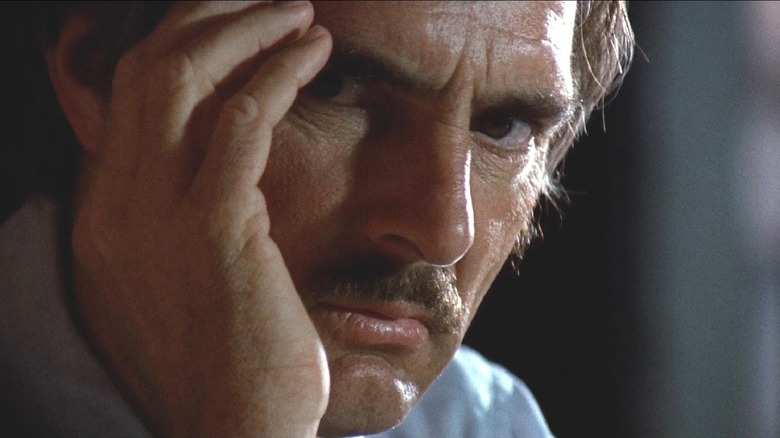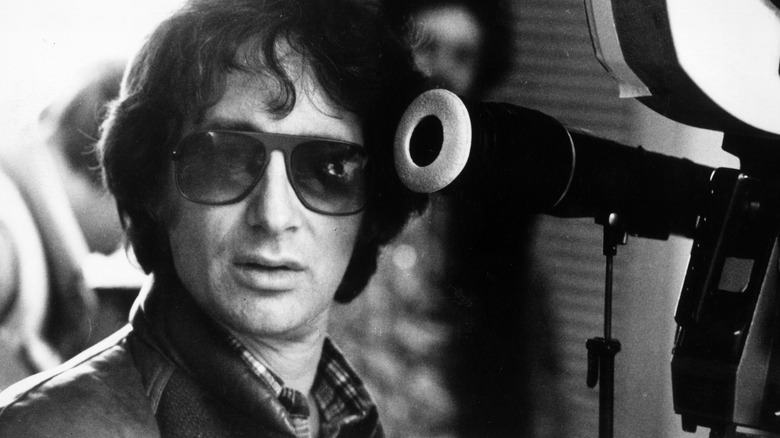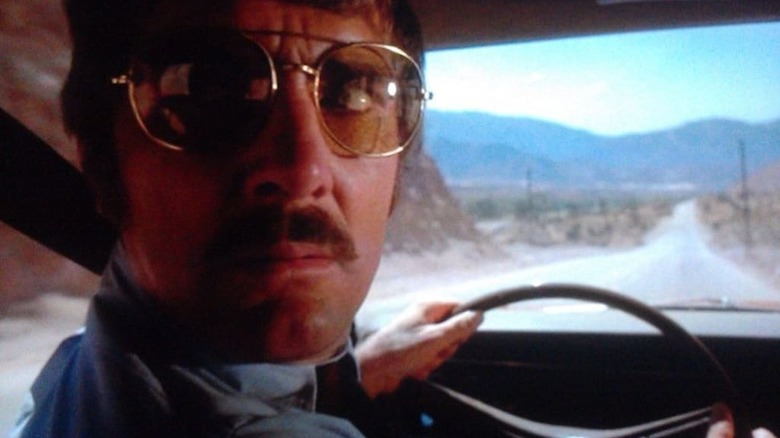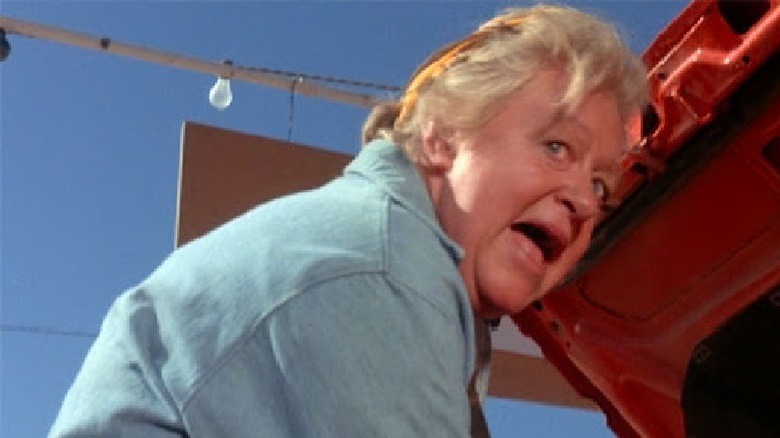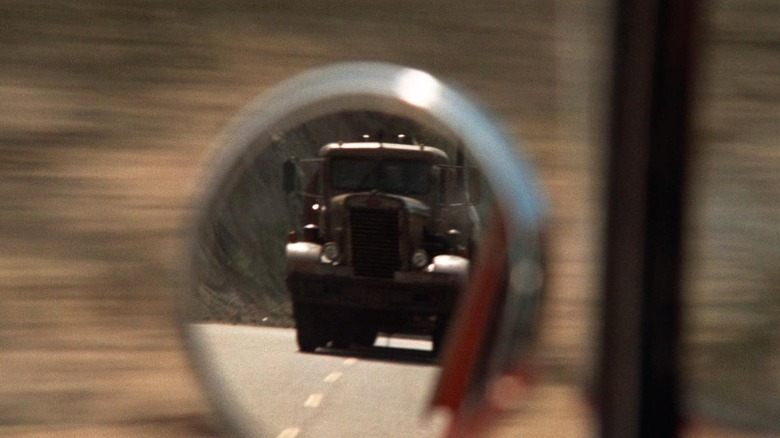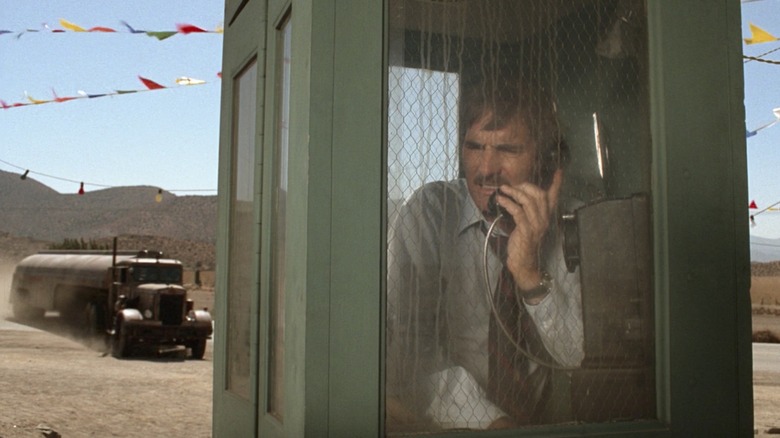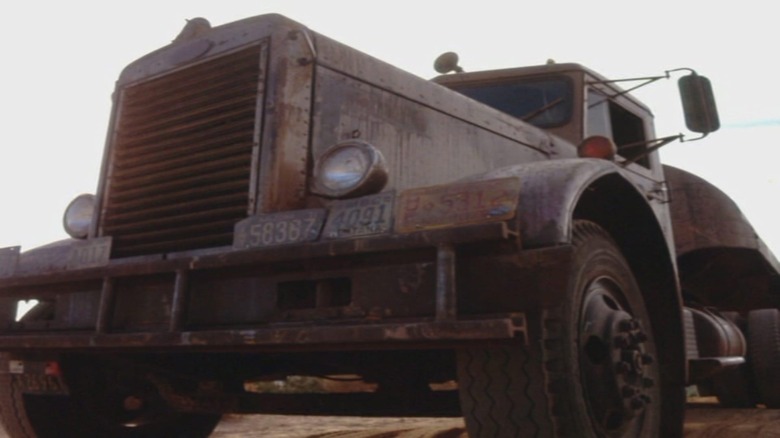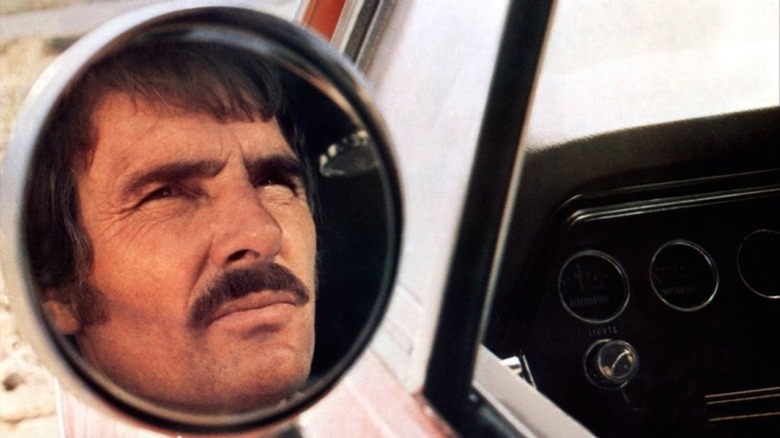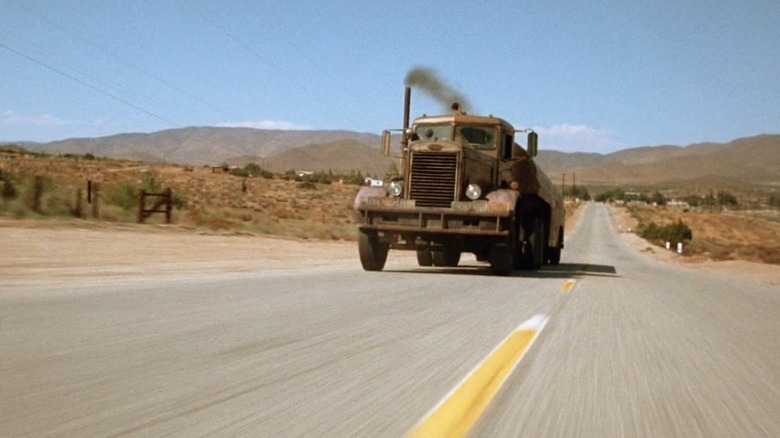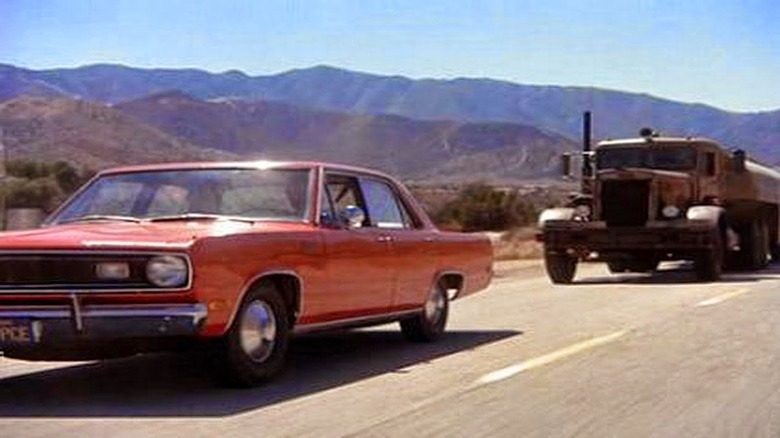The Untold Truth Of Steven Spielberg's Duel
It might be hard to imagine a time when Steven Spielberg wasn't a household name, but back in the early 1970s, the now-legendary director was a young up-and-coming talent who was yet to hit the big time. With a string of shorts and TV episodes under his belt –- including an excellent episode of "Columbo" –- Spielberg made the world sit up and take notice with the thrilling "Duel."
Some people have unfairly criticized Spielberg's propensity for big-screen blockbuster entertainment, and have also alleged that his work lacks the subversive nature of some of the films made by his contemporaries. However, when you delve further back to the very beginning of his career, you will find films from an audacious and confident filmmaker who not only understood his craft impeccably but acknowledged that films could say so much by doing so little.
This is certainly the case with "Duel," a compact cat-and-mouse thriller about a businessman who is relentlessly pursued by a malevolent truck driver. The film has very little dialogue and utilizes almost Hitchcockian levels of tension to tell its story in a way that is endlessly engaging and indicative of the young director's cineliteracy and immense talent.
"Duel" was the film that opened up the doors of Hollywood to Steven Spielberg, paving the way for his early films such as "The Sugarland Express" and "Jaws," which brought him worldwide attention. In the year of its 50th anniversary, we look back at this early Spielberg classic and bring you the untold truth of "Duel."
Duel is the feature directorial debut of Spielberg
There is some debate about which of Steven Spielberg's films is his feature directorial debut. Most people cite 1974's "The Sugarland Express" as the first feature film. However, if you can overlook a technicality regarding the release of "Duel," the latter should be considered as his directorial debut. The film originally aired on television on November 13, 1971, as the "ABC Movie of the Week" (via Mental Floss).
As a TV movie, Spielberg initially had to look to the ratings instead of the box office as an indication of whether "Duel" had performed well or not. As quoted in the book "Steven Spielberg and Duel: The Making of a Film Career" by Steven Awalt, Spielberg said, "The numbers came in, and I didn't understand the ratings. I just knew that if you got hired again, it meant somebody must've watched your last show."
People certainly did watch, and it proved to be a hit with critics as well. Norman Mark of the Chicago Daily News called it "the best TV movie of the year, and possibly the best such TV film yet created" (via "Steven Spielberg and Duel: The Making of a Film Career"). The original broadcast was around 74 minutes long — however, due to the success of the film and to make it eligible for a theatrical release, Spielberg shot some additional scenes to bring it up to 90 minutes. The boosted version of "Duel" was released in cinemas in the U.K. in October 1972, followed by Japan and several European countries in 1973.
Despite its origins as a TV movie, "Duel" was released theatrically, and given that it has gone on to become a cult favorite, it is only right that its place as Spielberg's directorial debut is restored.
Duel scriptwriter Richard Matheson was inspired by a real-life tailgater
It's likely that all motorists will have experienced the annoyance of being tailgated before. This was certainly the case for Richard Matheson who was inspired to write the story of "Duel" when he was tailgated by a particularly aggressive driver on the day of JFK's assassination (via The Guardian).
In an interview about the writing of "Duel," Matheson says how after the tailgating incident, "We were really shaken up by it, but having the true writer's mind, within a few moments I thought 'Ah! Man gets chased by a truck,' and I wrote it down on an envelope."
Matheson's story was published in an issue of Playboy magazine, and it was thanks to Steven Spielberg's secretary at the time, Nona Tyson, that the story made it onto his desk. Speaking of the incident Spielberg said, "I started laughing because she's giving me a Playboy to read, and she said, 'Don't look at the girls, read the short story. It is right up your alley'" (via Roger Ebert).
Tyson's intuition turned out to be spot on, and she was the one who followed the lead and found out that the teleplay was being produced by ABC and Universal but was without a director. Spielberg approached producer George Eckstein with his idea for shooting "Duel," and he was impressed with his energy, saying, "You work with a lot of directors, it's a job, but he was excited. His enthusiasm was infectious for everybody who worked with him" (via Roger Ebert).
There's a connection between Duel and Spielberg's 1941
It is not uncommon for a director to reference themselves in their movies, and this is certainly something that is the case in a lot of Steven Spielberg's films. Even before his shooting star trademark, Spielberg was slyly putting little Easter eggs into his films for the very observant fans.
In one memorable scene in "Duel," David Mann (Dennis Weaver) stops for some respite from the pursuing truck driver at a unique gas station run by an unnamed lady (Lucille Benson). As well as gas, there are some snakes, arachnids, and other reptiles on display. The unusual setting effectively keeps up the sense of unease that Mann is feeling, and when the truck driver decides to try and run him down while he makes a call, there is the added threat of loose spiders and rattlesnakes to contend with.
Eight years later, in Spielberg's farcical war comedy "1941," we see the same gas station. Capt. Wild Bill Kelso (John Belushi) makes an unforgettable entrance, asking for some "ethyl" to be put into his plane –- coincidentally Mann asks for the same for his car in "Duel."
In another fun nod, Lucille Benson also reprises her role as the proprietor of the gas station, but this time there are no snakes in sight. Unfortunately, the gas station meets a rather explosive end, so the run of it appearing in Spielberg's films ends with "1941."
The 'man vs. truck' storyline of Duel was heavily influential in Jaws
The big moment in Steven Spielberg's career came just four years after "Duel," when he released "Jaws." This film not only cemented Spielberg as a directing force to be reckoned with, but it also earned him a certain degree of notoriety, as it was a particularly troubled shoot. Cited by Guinness World Records as being the first summer blockbuster, "Jaws" undoubtedly changed cinema as we know it, and continues to be hugely influential.
There's a benefit to watching "Duel" when you know what comes next for the director, as there's a surprising number of similarities between the two. Both films draw their suspense and tension from the "cat-and-mouse" idea. In "Duel," the faceless truck driver is relentlessly pursuing an unsuspecting commuter, and in "Jaws," the main three characters are hunting down the shark that has been attacking the idyllic Amity Island.
The similarities don't end there, with both films also being focused on the battle against a largely unseen threat. Whether a shark or a truck driver, Spielberg knows how to expertly execute onscreen tension, knowing that the greatest fear lies in the audience's imagination rather than what they can see.
Spielberg has even gone as far as to suggest that making "Duel" was almost like the audition for making "Jaws." He said in an interview with Edgar Wright for Empire, "I told David Brown and Dick Zanuck, please watch 'Duel,' because 'Duel' is basically 'Jaws' on land. I really think it qualified me to direct 'Jaws.'"
Dennis Weaver did most of the stunts himself and drove for over 2,000 miles
With a sparse cast and limited dialogue, much of "Duel" hinges on the performance of the main character, David Mann (Dennis Weaver) who has the pivotal role. Weaver was incredibly committed to the part, throwing himself into all other aspects of the production, including doing the majority of the stunts himself and driving for more than 2,000 miles during the shoot (via New York Times).
In a 2001 interview with Ian Freer, Weaver talks about working with Spielberg, saying, "It was so exciting to work with Steven ... he was very imaginative and very creative. The thing that impressed me was that despite being so young he was absolutely fearless about using whatever was necessary to make the movie work."
In the same interview, he also talks about doing the stunt work in the film, including one of the most famous scenes in the film –- the truck hurtling toward him while he is in a phone booth. Weaver said, "I have a very strong memory of that. All of a sudden I said, 'Hey Steven, you don't need a stunt double, I'll get in there and do that.' I was in that telephone booth ... it ran through my mind — what the hell was I doing in here? Where do I jump out? I had to gauge that on the sound I heard. I had a real moment where I thought, 'That's a pretty stupid thing to do.'"
Spielberg's team did a 'casting call' for the truck
In addition to Dennis Weaver in the central role of David Mann, there were a couple of other important players in "Duel" -– the two vehicles at the center of the cat-and-mouse battle for survival. For Mann's car, a bright red Plymouth Valiant was chosen, the color choice deliberate for it to stand out against the California wilderness.
For the truck, it was important to get the choice right. As the audience never sees the malevolent driver of the truck, the vehicle itself had to be frightening and imposing enough for them to feel the fear in the same way Mann does when it is following him.
Just like an actor has to audition for a role, there was an audition of sorts for the truck. Steven Spielberg recalls, "The art director had a sort of casting call for trucks. There were about seven semis waiting for me to cast the star of Duel" (via Hagerty). The part of the truck eventually went to a 1955 Peterbilt 281 tanker that, according to Spielberg, "Had a face; the windows are the eyes, and it had a huge protruding snout ... the wheels and bumper are the mouth."
This was another example of Spielberg getting the casting right for one of his films, as the truck provides the perfect nemesis, a formidable and frightening screen presence that will cause everyone to watch their rear-view mirrors a little closer than normal.
The film was made on a shoestring budget and shot in around a fortnight
In the early days of his filmmaking, there was the sense that Steven Spielberg was flying by the seat of his pants. "Duel" is certainly an example of that, with a budget of around $400,000 and a compact shooting schedule (via Mental Floss).
The low-budget nature of "Duel" is something that suits the film -– it may be a bit rough around the edges, but it works perfectly for the gritty tone, and critics agreed with how much was achieved with so little. Maria D. Laso of the LA Times praised Spielberg's "economical" film, and Kevin Maher writing for The Times called it "a shoestring marvel."
In terms of how long the shoot took, reports vary between 11 and 16 days, however, Spielberg, in an interview with Empire said, "The reaction I had over the last decade is how I don't know any of us made that movie in eleven days. I just have no idea. I can't figure it out. We must have hit the ground running and not stopped running until the last shot."
In the same interview, Spielberg talked about the frantic filming schedule for the film saying, "Duel was 50% planning and 50% panic ... Fortunately, the actor I cast — Dennis Weaver — had his game face on the entire time we filmed and he sprinted, along with the rest of us, from one setup to the next. As did Jack Marta, my DP, and a skeleton crew who had never made a movie before while on the run. Literally running."
The truck's 'roar' was taken from Creature from the Black Lagoon and used again in Jaws
Steven Spielberg has made a handful of "monster movies" in his career, including "Jaws" and "Jurassic Park." You could even argue that "Duel" is a monster movie of a very different kind. It feels only right that this young director would look to some of the classic monster movies of the past for some inspiration.
One such film was 1954's "Creature from the Black Lagoon," and while this film may have provided more of an influence on "Jaws," there was one small element that Spielberg took from it –- and then re-used again in "Jaws." "Duel" producer George Eckstein later confirmed that they used the death knell of the creature for the sound of the truck as it goes over the cliff edge (via Hagerty).
Speaking to Edgar Wright in Empire, Spielberg talks about re-using the sound again for "Jaws." He said, "I asked the sound effects editor on 'Jaws' to go into the library and find the death rattle of the truck of Duel and put it underwater with the shark and he did."
Spielberg borrowed the camera used in Bullitt for the low-angle shots
As a young director, Spielberg was ambitious and fearless when it came to making movies, and while the stories behind "Jaws" are now legendary, there is plenty in "Duel" as well that demonstrates the bold risks he was willing to take when it came to getting the perfect shot.
In their viewer's guide to "Duel," Empire referred to the particular methods employed by Spielberg to get the pulse-raising, low-angle shots in the chase sequences, including the special camera invented for the Steve McQueen film "Bullitt." The article explains the camera "was only 6 [inches] off the ground and allowed Spielberg to capture thrilling off-the-chain action."
Talking about the making of the film with Empire, Spielberg said, "I shot much of this with five cameras that included a camera mounted inside the picture car, as well as mounted cameras on the blind side of the red car and the truck. If four of my cameras were filming run-bys from right to left, on the opposite side of the vehicle we mounted cameras that were capturing useful footage to be used later in the show when the vehicles would be traveling left to right."
Dennis Weaver, speaking in 2001, talked about Spielberg's ambitious filming of the climactic scene saying, "I had never worked with a director that had used more than two cameras at any one time. And this guy had six cameras out there shooting that scene. I said, 'Boy, he's got a lot of gall.'"
